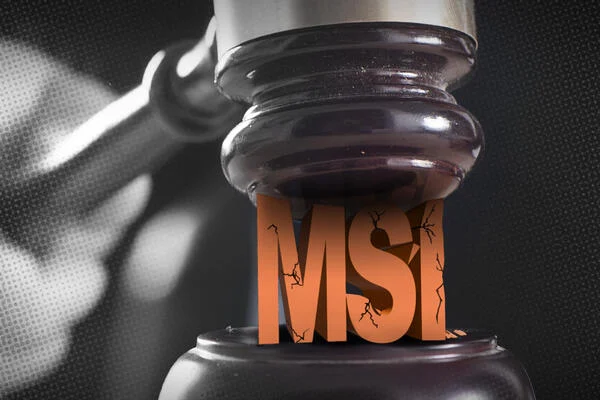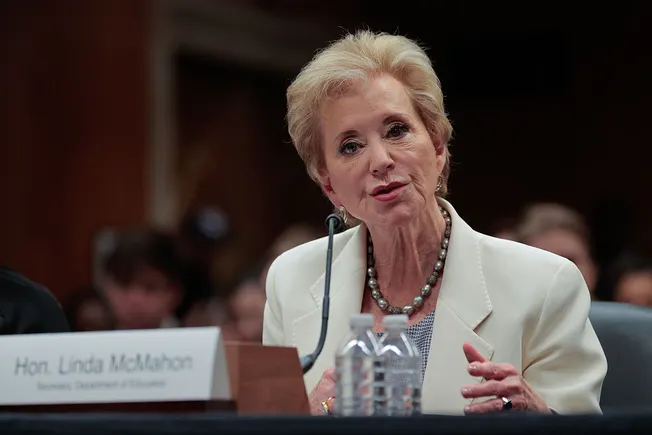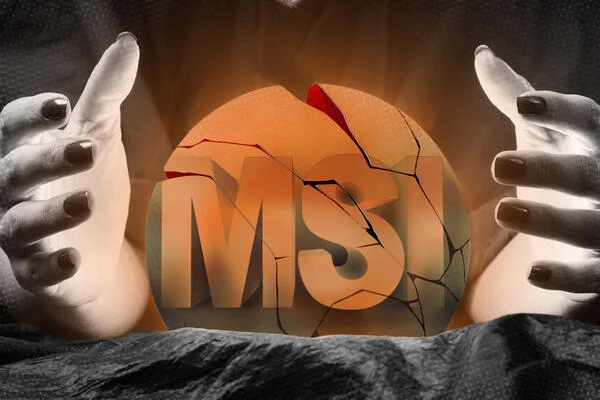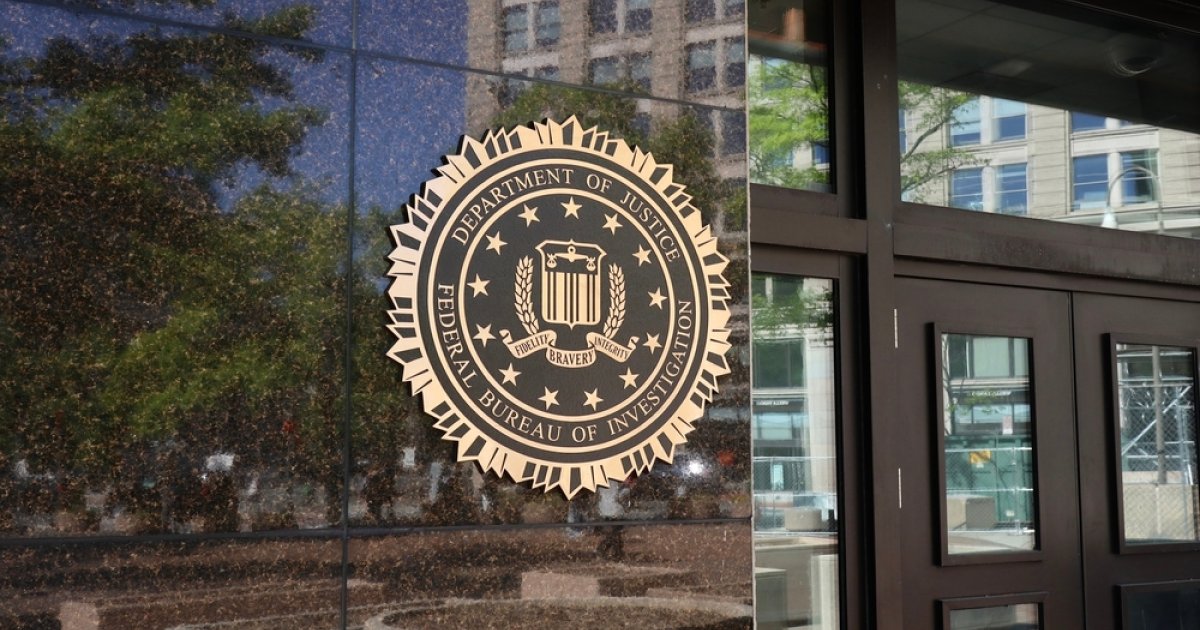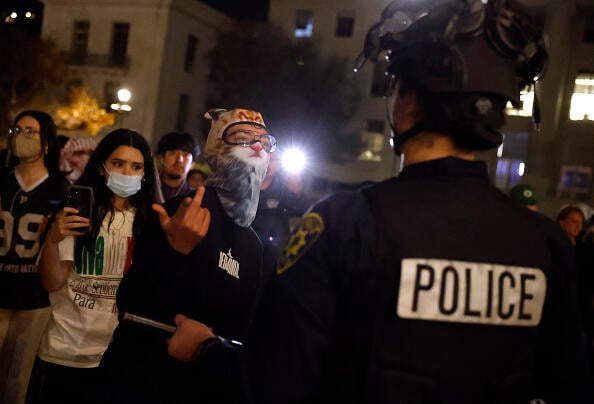Attorney General Pam Bondi reportedly sent a memo two weeks ago indicating how the federal government intends to target “domestic terrorist organizations.” That memo outlines how the Justice Department plans to implement President Trump’s National Security Presidential Memo 7.
To explain what’s wrong with Bondi’s memo, we need to bounce back and forth between it and NSPM-7. Think of it this way: NSPM-7 is an idea, and Bondi’s memo is a checklist in furtherance of that idea. At the same time, the memo isn’t quite a blueprint, because it still omits key details about what the Justice Department intends to do. But what it does include is alarming.
NSPM-7 was issued in late September and announced a federal government effort to identify “domestic terror organizations.” It also listed specific ideologies, like “anti-Americanism, anti-capitalism, and anti-Christianity,” as “common threads” motivating political threats and violence.
In the memo, the attorney general ordered all federal law enforcement agencies to “review their files and holdings for Antifa and Antifa-related intelligence and information” and turn it over to the FBI within 14 days. The FBI is directed to then report to the deputy attorney general which groups (if any) are engaged in acts that “may constitute domestic terrorism.”
Bondi’s memo also includes two new elements in this process: promoting the FBI’s terrorism tip line, and establishing a cash reward system for reports that lead to the identification and arrest of the leaders of domestic terrorism organizations.
A few problems jump out at me.
The Bondi memo, like NSPM-7, blurs the line between investigating crimes and ideologies
Like NSPM-7 before it, Bondi’s memo states that recent political attacks share common motivating ideologies, saying that groups are using terrorism to advance agendas like “radical gender ideology, anti-Americanism, anti-capitalism, or anti-Christianity.” As I said in September, the government has inappropriately targeted groups by ideology in the recent past:
During the Obama administration, the IRS targeted nonprofit groups with the words “Tea Party” or “Patriots” in their names, identifying groups by ideology and punishing them by subjecting them to extra processes. And its explanation was that this was just a “shortcut” — other organizations with similar profiles had violated IRS rules, so they jumped to targeting groups that used similar words.
In 2023, the FBI distributed an internal memo linking “ethnically motivated violent extremists” to traditional Catholic ideology, a call for viewpoint-based targeting that was only exposed by a whistleblower and oversight from Congress. In 2022, an internal FBI memo linked the Gadsden flag and other patriotic symbols to violent extremism. And while such links do exist, and it makes sense for law enforcement to identify them, it also risks sweeping up ordinary Americans.
These tactics create the risk that any member of any political movement could find themselves added to a government list and subjected to special scrutiny if others with the same ideology commit an ideologically motivated crime. But it’s not a crime (terrorism or otherwise) to hold “radical” beliefs about “gender ideology” or to take positions on core American values that contradict the government’s view.
This happened before during the McCarthy era. Communist rhetoric resonated with some 1950s Americans who wanted working people to have decent wages, but that did not mean most American socialists were Soviet spies or conspired to overthrow the government. Nonetheless, accusations of vast criminality were used to justify sprawling government investigations into groups that espoused socialist views.
You can’t vindicate American values against anti-American ideologies with un-American practices like warmed-over McCarthyism.
I want to be clear that saying ideology should not be the starting point of an investigation is not at all to diminish the very real, ideologically-motivated threats faced by government employees, politicians, and political actors. The memos mention Charlie Kirk’s assassination and the October shooting at a Dallas ICE facility among other incidents; they could just as easily include the assassination of Minnesota State Rep. Melissa Hortman and her husband, the 2011 shooting of Rep. Gabrielle Giffords, or the 2017 shooting of Rep. Steve Scalise. There are people who want to hurt or kill public officials and public figures for doing their jobs, and those people will often offer ideological reasons for doing that.
However, that some terrorists have an ideology does not make everyone with the same ideology a terrorist.
And that is the core problem with this whole endeavor. People who conspire to engage in actual criminal behavior should be investigated, arrested, and prosecuted. But these memos aren’t narrowly focused on groups that exist for the purpose of ideologically motivated violence, which act to bring about violence; they broadly condemn particular viewpoints and lay a foundation for a government watchlist of American groups which share those viewpoints. And where does that get us? You can’t vindicate American values against anti-American ideologies with un-American practices like warmed-over McCarthyism.
‘Domestic terrorist organization’ designation is still a matter of AG whims
While the phrase “domestic terrorist organization” sounds very official, it doesn’t have a statutory definition or accompanying due process protections, unlike its nominative counterpart, the foreign terrorist organization. NSPM-7 delegated to the attorney general the ability to recommend which groups should be so designated, but not whether they will be.
Bondi’s memo directs federal law enforcement to provide information to the AG’s office that would presumably guide those initial recommendations, but offers no further information on duration or appeals. It doesn’t even suggest that a group so designated would be given notice of that designation.
Why everything Pam Bondi said about ‘hate speech’ is wrong
The nation’s top law enforcement officer doesn’t understand there is no hate-speech exception to the First Amendment — and that’s scary.
Read More
NSPM-7 essentially argues a domestic terrorist organization is an organization with members who commit acts meeting the statutory definition of domestic terrorism. That definition includes unlawful “acts dangerous to human life” that “appear to be intended to intimidate or coerce a civilian population” or “influence the policy of a government by intimidation or coercion.” It includes no requirement that the organization itself have unlawful aims or that the members’ actions are in furtherance of them.
By asking the FBI to compile “a list of groups or entities engaged in acts that may constitute domestic terrorism” as defined by statute, Bondi’s memo at first seems to be more narrowly focused. But that limitation remains an exercise of discretion, and could change as directed by the president or a successor. And it’s not even entirely clear that the list provided by the FBI is the exclusive source in Bondi’s decision-making process, or what that process looks like after she received the list.
One reason to question how much this definition is cabined in practice is that the administration has designated Antifa a domestic terrorist organization. But Antifa is mostly an ideology, not a defined organization, as such. There might well be domestic terrorist organizations that hold Antifa-aligned tenets, but a philosophy is not an organization, even if some organizations refer to it in their names. Designating Antifa as a terrorist organization is a little like planning to meet someone at a restaurant and you pick the restaurant “hamburger.”
Doxing isn’t ‘domestic terrorism’
The Bondi memo also repeats, and expands on, NSPM-7’s decision to treat doxing (publishing information online that makes specific people identifiable) as a crime that counts as “domestic terrorism.” But as I said in September, it often isn’t:
Doxing is protected speech unless it violates some other existing law. After all, doxing describes much of the basic activity of news media, where otherwise unknown information is found and published, and frequently, that information is personally identifiable. That’s especially true when the “doxing” the government is upset about is information related to public employees in the course of their duties, such as the location of ICE agents.
Bondi does not agree. After someone developed ICEBlock, an app for users to share the locations of ICE activity, Bondi said in an interview: “We are looking at it, we are looking at him, and he better watch out, because that’s not protected speech.”
Note that ICEBlock is, in fact, protected speech. The ability to share facts about public employees in the execution of their duties in public spaces is not a gray area under the First Amendment; it’s protected speech.
The theory under which Bondi seems to be operating is that if people know where ICE activity is happening, they will use that information either to engage in violence against agents or to evade lawful court orders. In July, congressional republicans sent Bondi a letter stating: “Sharing real-time locations of ICE officers paints targets on their backs, increasing the likelihood that they face immediate resistance.”
ICEBlock was removed from the Apple store in October (as were similar apps and groups on other platforms), with Apple saying it took that decision “based on information we’ve received from law enforcement about the safety risks associated with ICEBlock.” Earlier this week, ICEBlock’s developer sued the Trump administration, arguing that pressure from the government led to the app’s removal.
Trump’s ‘domestic terrorism’ memo chillingly targets people by ideology
Trump’s “domestic terrorism” memo blurs the line between policing crimes and policing beliefs — with chilling echoes of McCarthyism.
Read More
ICE agents have indeed faced violence, including a July shooting at a facility in Alvarado, Texas and a September sniper attack in Dallas that left two detainees and the gunman dead. So far, however, there is no evidence these actions were related to ICEBlock or any other ICE-tracking app or website. And there are lots of legitimate reasons people might want to know the location of ICE activity that don’t involve violence or frustrating the enforcement of laws — like avoiding traffic delays or not wanting to be caught in the middle of a mass arrest that doesn’t involve them. An app that shows the location of ICE raids no more aids terrorism against ICE agents than a street map showing a residential area aids home invasions.
References to doxing as “acts of domestic terrorism” in the Bondi memo could be the administration doubling down on its condemnation of ICEBlock and similar apps, hoping to at least chill their use by implication, if not outright threaten to prosecute them for aiding domestic terrorism. Treating doxing (which is protected speech) as domestic terrorism opens the door to government investigations of people who oppose ICE with truthful, public information.
Anonymous tip line exacerbates potential for abuse
The president and AG have identified a number of ideologies shared by domestic terrorists, argued these shared ideologies indicate group sponsorship, and want to encourage people to make more reports (anonymous or otherwise) about the topic. The FBI already has a tip line, and it accepts anonymous reports. Bondi’s memo just directs that the FBI consider how to better promote it for this specific purpose.
But what is the specific purpose that the administration intends to promote? Both NSPM-7 and the Bondi memo seem to target both crime (which they should) and beliefs (which they should not). Blurring the line between the two could make this a hotline for reporting wrongthink. We have seen the effect of anonymous reporting hotlines for ideological wrongthink in the context of campus Bias Response Teams:
They frequently record accusations without providing a method of contesting their reports or even identifying the accusing party. Vague accusations of racism rooted in innocuous behavior is an exceptionally common feature of cancellation attempts. In promising to punish (potentially with police help) accusations of racism while obscuring the identity and motives of the accuser, BRTs are perfect engines for ideological abuse.
Bondi, Vice President JD Vance, and Stephen Miller have all recently called for punishing non-criminal behavior through either state power or cancel culture. An FBI hotline collecting reports of non-criminal activity (like doxing) would be a troubling escalation — one that should trouble even those who agree with the spirit of Bondi’s memo. That’s because the power the hotline grants would exist for the next administration, too, which might not see the world in quite the same way.
All of this creates a real chilling effect
As I wrote in September, “when the president uses his pen to take aim at anything, it will cause a chilling effect.” The attorney general’s pen is no less frosty as it conveys the message of likely or possible criminal prosecution.
In a footnote, Bondi’s memo says that “no investigation may be opened based solely on activities protected by the First Amendment” or other civil rights. But it also identifies protected speech — doxing — as a criminal act of terrorism. What other non-criminal activities might yield investigations? Presumably things related to the viewpoints listed in NSPM-7 and reiterated again in the Bondi memo. In turn, Americans will act rationally — and become less likely to say what they really think.
We might know more in 30 days, when the FBI reports to the deputy AG the results of its review of groups. Check back then for more.
(H/t to Ken Klippenstein for actually publishing the memo)


